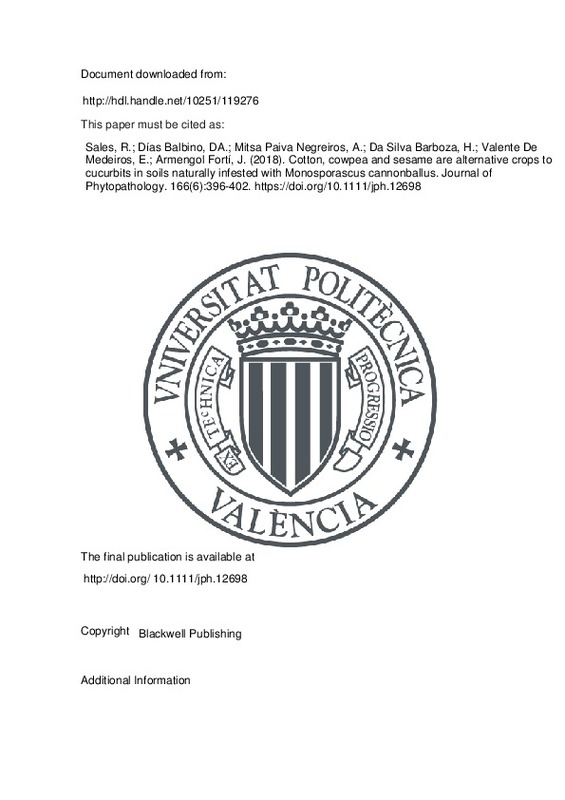JavaScript is disabled for your browser. Some features of this site may not work without it.
Buscar en RiuNet
Listar
Mi cuenta
Estadísticas
Ayuda RiuNet
Admin. UPV
Cotton, cowpea and sesame are alternative crops to cucurbits in soils naturally infested with Monosporascus cannonballus
Mostrar el registro sencillo del ítem
Ficheros en el ítem
| dc.contributor.author | Sales, R.
|
es_ES |
| dc.contributor.author | Días Balbino, Deyse Anne
|
es_ES |
| dc.contributor.author | Mitsa Paiva Negreiros, Andréia
|
es_ES |
| dc.contributor.author | da Silva Barboza, Hailton
|
es_ES |
| dc.contributor.author | Valente de Medeiros, Erika
|
es_ES |
| dc.contributor.author | Armengol Fortí, Josep
|
es_ES |
| dc.date.accessioned | 2019-04-11T20:01:00Z | |
| dc.date.available | 2019-04-11T20:01:00Z | |
| dc.date.issued | 2018 | es_ES |
| dc.identifier.issn | 0931-1785 | es_ES |
| dc.identifier.uri | http://hdl.handle.net/10251/119276 | |
| dc.description.abstract | [EN] Monosporascus cannonballus is an important cucurbit root pathogen, which has been reported in the main production areas of melon and watermelon in Brazil and worldwide and potentially capable to colonize roots of different species. Crop rotation is considered an effective management strategy to prevent this disease. The aim of this study was to evaluate the response of different crops, pumpkin, cotton, cowpea, sesame, watermelon, melon, corn, cucumber, sorghum and tomato, to the infection of this pathogen. Seedlings were transplanted into plastic containers with an inoculum concentration of 20 colony-forming units (CFU) g(-1) of M.cannonballus. Fifty days after transplanting, the variables analysed were the degree of disease severity on the root system and the frequency of reisolation. On cucurbits, the results demonstrated different degrees of susceptibility among crops and cultivars, being melon and watermelon the most sensitive species. In contrast, Cucurbita cultivars were the most tolerant. Regarding non-cucurbit crops, maize, sorghum and tomato presented root discoloration and M.cannonballus was reisolated from roots. Cotton, cowpea and sesame cultivars were not affected by the pathogen, so they can be considered as alternative crops to be cultivated, or in rotation with cucurbits, in M.cannonballus infested soils. | es_ES |
| dc.description.sponsorship | We are thankful to Conselho Nacional de Desenvolvimento Cientifico e Tecnologico-CNPq for the research fellowships granted to Rui Sales Junior e Erika Valente de Medeiros. | |
| dc.language | Inglés | es_ES |
| dc.publisher | Blackwell Publishing | es_ES |
| dc.relation.ispartof | Journal of Phytopathology | es_ES |
| dc.rights | Reserva de todos los derechos | es_ES |
| dc.subject | Crop rotation | es_ES |
| dc.subject | Host range | es_ES |
| dc.subject | Monosporascus root rot and vine decline | es_ES |
| dc.subject | Pathogenicity | es_ES |
| dc.subject | Soilborne pathogen | es_ES |
| dc.subject.classification | PRODUCCION VEGETAL | es_ES |
| dc.title | Cotton, cowpea and sesame are alternative crops to cucurbits in soils naturally infested with Monosporascus cannonballus | es_ES |
| dc.type | Artículo | es_ES |
| dc.identifier.doi | 10.1111/jph.12698 | es_ES |
| dc.rights.accessRights | Abierto | es_ES |
| dc.date.embargoEndDate | 2019-06-01 | es_ES |
| dc.contributor.affiliation | Universitat Politècnica de València. Departamento de Ecosistemas Agroforestales - Departament d'Ecosistemes Agroforestals | es_ES |
| dc.description.bibliographicCitation | Sales, R.; Días Balbino, DA.; Mitsa Paiva Negreiros, A.; Da Silva Barboza, H.; Valente De Medeiros, E.; Armengol Fortí, J. (2018). Cotton, cowpea and sesame are alternative crops to cucurbits in soils naturally infested with Monosporascus cannonballus. Journal of Phytopathology. 166(6):396-402. https://doi.org/10.1111/jph.12698 | es_ES |
| dc.description.accrualMethod | S | es_ES |
| dc.relation.publisherversion | http://doi.org/ 10.1111/jph.12698 | es_ES |
| dc.description.upvformatpinicio | 396 | es_ES |
| dc.description.upvformatpfin | 402 | es_ES |
| dc.type.version | info:eu-repo/semantics/publishedVersion | es_ES |
| dc.description.volume | 166 | es_ES |
| dc.description.issue | 6 | es_ES |
| dc.relation.pasarela | S\361581 | es_ES |
| dc.contributor.funder | Conselho Nacional de Desenvolvimento Científico e Tecnológico, Brasil |







![[Cerrado]](/themes/UPV/images/candado.png)

